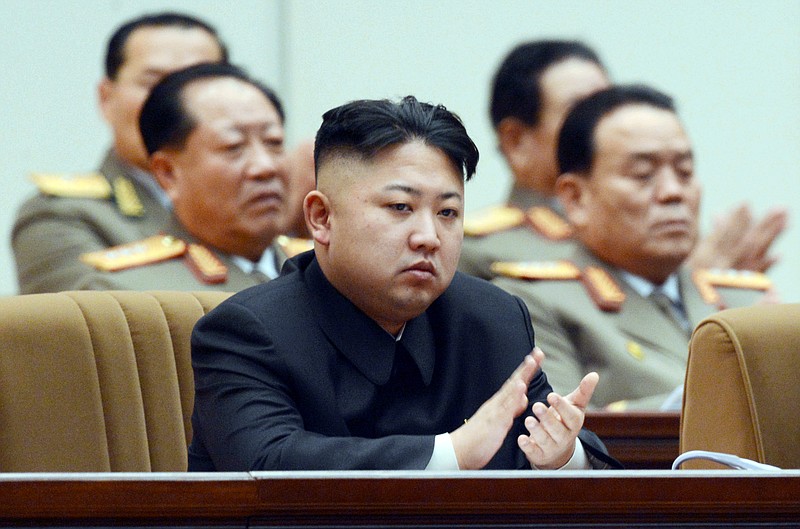A large piece of the puzzle has been missing from recent discussions about North Korea by the Democratic candidate for president of the United States in light of the Asian country's recent fifth nuclear test.
The missing piece is the action of one William Jefferson Clinton, the 42nd president and husband of the candidate.
In 1994, the then-president's administration signed an agreement with North Korea in which that country would, in the president's words, "freeze and dismantle its nuclear program. The entire world will be safer as we slow the spread of nuclear weapons. The United States and international inspectors will carefully monitor North Korea to make sure it keeps its commitments."
How'd that work out for us?
Yet, Hillary Clinton took aim last week at Republican candidate Donald Trump, who has not revealed a specific policy for the region.
"This [nuclear test] is another reminder that America must elect a president who can confront the threats we face with steadiness and strength," she said. " And we need a president committed to reducing - not increasing - the number of nuclear weapons and nuclear states in the world. More countries with nuclear weapons in Northeast Asia would increase the chances of the unthinkable happening. We cannot take the risk."
This is the same woman who, as secretary of state for President Barack Obama, worked behind the scenes to organize talks for a nuclear agreement between the United States and terror sponsor Iran. The resulting agreement, concluded under her predecessor, John Kerry, heavily favored Iran, released billions of dollars to the Middle East country with which it can purchase weapons and allows Iran to be a nuclear nation in a decade (if it doesn't surreptitiously become one beforehand).
A recent Washington Post article noted that "the foreign-policy establishment remains overwhelmingly opposed to Donald Trump's bid for the White House, unifying around Hillary Clinton as the only responsible option."
However, the newspaper's very words, "the foreign-policy establishment," explain everything the electorate needs to know. It is the "foreign-policy establishment" that gave us the North Korea nuclear deal, the Iran nuclear deal, the power vacuum in Iraq that gave way to the Islamic State and the hands-off Russia policy that allowed it to take the Crimea and threaten Ukraine.
Whatever you may believe about Donald Trump, he is a businessman intelligent enough to put the right people in the right positions if he were to become president.
Chattanooga's own Sen. Bob Corker, R-Tenn., for instance, has been mentioned as a possible secretary of state. The thought of the smart and pragmatic Corker dealing with the North Korean situation is infinitely better than the thought of anyone from the Obama or previous Clinton administration doing so.
Clinton, either because she hopes to gather the coalition that made Obama president or because she believes in it herself, has made it clear that her policies as president would be very similar to those Obama has espoused for nearly eight years.
That alone is enough for us to long for hope and change.
But back to the Bill Clinton administration. The 1994 North Korea deal, called the Agreed Framework, was - like the Iran deal - an executive agreement not privy to Senate ratification. In exchange for freezing and dismantling its nuclear weapons program, North Korea was to receive two nuclear power plants built with proliferation-resistant, light-water reactors.
The year after George W. Bush became president in 2001, the U.S. confronted North Korea with evidence it had been pursuing a secret uranium-enrichment program since the middle of the second Clinton term. North Korea admitted work on its nuclear program to Assistant Secretary of State James Kelly but refused to end it. That prompted the U.S. to withdraw its supply of fuel oil, the agreement to break down and North Korea to ramp up its nuclear weapons program again.
The recent nuclear test - the largest to date - was North Korea's second in eight months. The tepid responses from Obama - that the U.S. would never accept the country as a nuclear power - and Hillary Clinton - that the U.S. would not let North Korea pursue a nuclear weapon - show that neither wants to admit what is already plain. The ship on keeping the country from developing a nuclear program - and the ballistic missiles on which to use them - has sailed. The question now is how, if at all, the situation will be confronted.
With a future Clinton administration, we know what we'll get concerning North Korea - business as usual. Ho hum. Nothing to see here. With a Trump administration, a spokeswoman said last week, "he wouldn't do what's being done now."
That's not a lot to go on, but the Clinton and Obama administrations have given us two nuclear agreements, one country that broke its agreement and is on the verge of being a nuclear power and one which could be doing the same thing even now. The results are hardly the picture of "steadiness and strength" with which Hillary Clinton paints herself.
